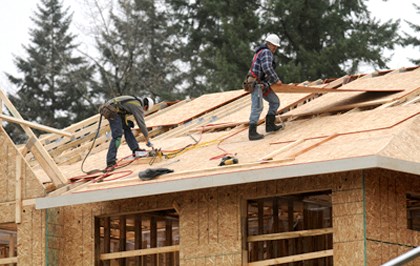The number of housing starts in Coquitlam jumped dramatically in the first six months of 2016 but the residential real estate market is starting to show signs of cooling, according to the deputy city manager.
During a council-in-committee meeting last week, John DuMont told council there is some uncertainty as to whether the upward trends in housing transactions seen over the last few years in Metro Vancouver will continue.
“Where the real estate market is heading now is a bit of a question mark,” he told council. “There appears to be a bit of a cooling.”
The city’s semi-annual economic development activity report noted gradually increasing interest rates could dampen sales and that it would take some time before the impact of the provincial government’s recently instituted 15% foreign buyers tax would be seen in transaction figures.
DuMont’s statement echoed numbers from the Real Estate Board of Greater Vancouver (REBGV), which were released earlier this month. According to the REBGV data, the total number of transactions for detached homes, attached homes and apartments dropped 29% from 501 in July to 351 in August.
The Tri-City figures track what is being seen in the rest of the region, where residential property sales fell 26% in August 2016 compared to the same month in 2015.
Still, the number of housing starts in Coquitlam was up significantly.
In the first half of 2016, the city saw a 70% increase in housing starts compared to the same time last year, outpacing the Metro Vancouver average of 49%. A report to council attributed the pace to low interest rates, employment and population growth and demand for homes in the area.
Other news:
IND. DEMAND
Residential real estate is not the only area experiencing strong demand in Coquitlam.
According to the city’s economic development activity report, the industrial vacancy rate is 0.9% — lower than the Metro Vancouver average of 1.5%. A staff report attributed the numbers to the fact that the low dollar has increased demand for Canadian exports.
“The demand for space is well in excess of the supply available and, as a result, lease rates are increasing and vacancy rates are decreasing,” said the document.
But given a lack of developable industrial land in Coquitlam, it is unlikely that the city will be able to ease its vacancy rates anytime soon. The staff report stated that sales and leasing activity has slowed due to the lack of vacant space and that industrial inventory is expected to remain fairly consistent.
One project, the Fraser Mills site proposed by the Beedie Group, would add approximately 11,000 sq. m to the city’s existing 662,450 sq. m of industrial floor space in 2017.
FRASER MILLS HEARING
A public hearing will be held next Monday to give Coquitlam residents an opportunity to weigh in on changes to the Beedie Development Group’s proposed Fraser Mills project.
The developer is asking council to allow it to reduce the industrial density on one part of the property and transfer it to another section that will be developed later. If the recommendation is passed, it would also allow a reduction in parking from 1.5 stalls for every 100 sq. m to one stall for every 100 sq. m.
The hearing will take place in council chambers (3000 Guildford Way) at 7 p.m. on Oct. 3. For more information, go to www.coquitlam.ca.



